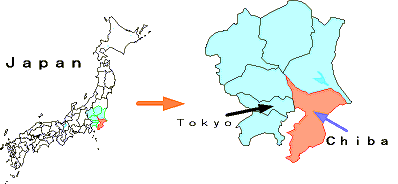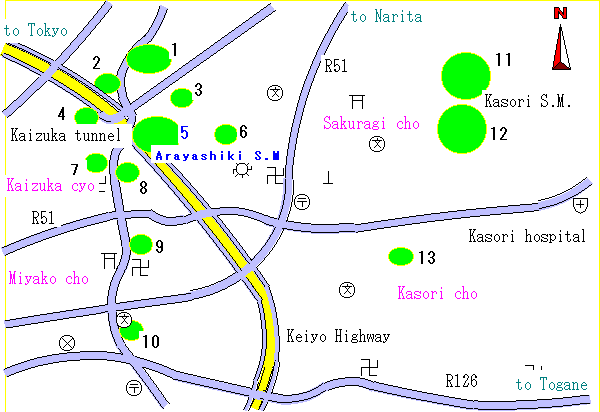
(The center part of Chiba City)

Shellmounds Distribution
 |
|||
| Shellmounds in the town of Kasori,Kaizuka,Miyako,Sakuragi (The center part of Chiba City) |
|||
 |
|||
| 1.Kusakariba(L-F) | 2.Kusakariba south(L) | 3.Higashibeda(E) | 4.Arayashiki west (E) |
| 5.Arayashiki(M-L) | 6.Ubagasaku(L) | 7.Saikoin(E-M) | 8.daimon(L-F) |
| 9.Kidoba(E) | 10.Mukoudai(E) | 11.Kasori north(M-L) | 12.Kasori south(M-F) |
| 13.Hanawa(M-L) | |||
The characters in emphasis shows Jomon phases IC:Incipient I:Initial E:Early M:Middle L:late F:Fimnal
<<< What shellmound tells me. >>>
A small size shell mound with the diameter of 1 ~50m is the site where the eaten shellfish was discarded. Such a small shellmound almost existed in the constant number. If the great shellmound like Kasori Shellmound or Arayasiki Shellmound (diameter over 100m) is a mere dust desertion place, followings are considered.
i. Chiba citizen liked shellfish crazily in Jomon period
ii. Giant or glutton had come to live
iii. Population increased abnormally
It seems to differ except for iii. Many kinds
of stone tool and accessory are excavated
at Chiba City shellmounds, although there
is no mountain or wide river to get the stone
in Chiba City. The stone tool are made of
the raw ore of Gunma or Saitama, Hakone,
Izu-Island. It is supposed that Chiba citizen
bartered the dried shellfish made at great
shellmound for stone tool or accessory. The
great shellmound might have been the food
factory of dried shellfish in Jomon period.
<<<Dried shellfish tastes good>>>
Although raw fish is a mainstream as delicious
foods in present Japan, the dried fish or
dried shellfish is unexpectedly tastily.
Chiba citizen produced dried shellfish gathering
it at the beach, boiling it with sea water
in pottery and drying with the sunshine in
Jomon period. By drying shellfish, it can
be preserved and becomes delicious food by
the disassemble of protein to amino acids.
The people of landlocked area might be drawn
to this deliciousness and become healthy
by assimilating an appropriate salt. The
people of the Gunma Pref. etc. might desire
dried shellfish at that time. The worth of
dried shellfish might have been high as healthy
food. The dried shellfish was a precious
thing as the ingestion resource of salt,
not as a protein resource. "Salt"
had not been manufactured when great shell
mound was made (3,000B.C to 1,000B.C. in
Chiba).